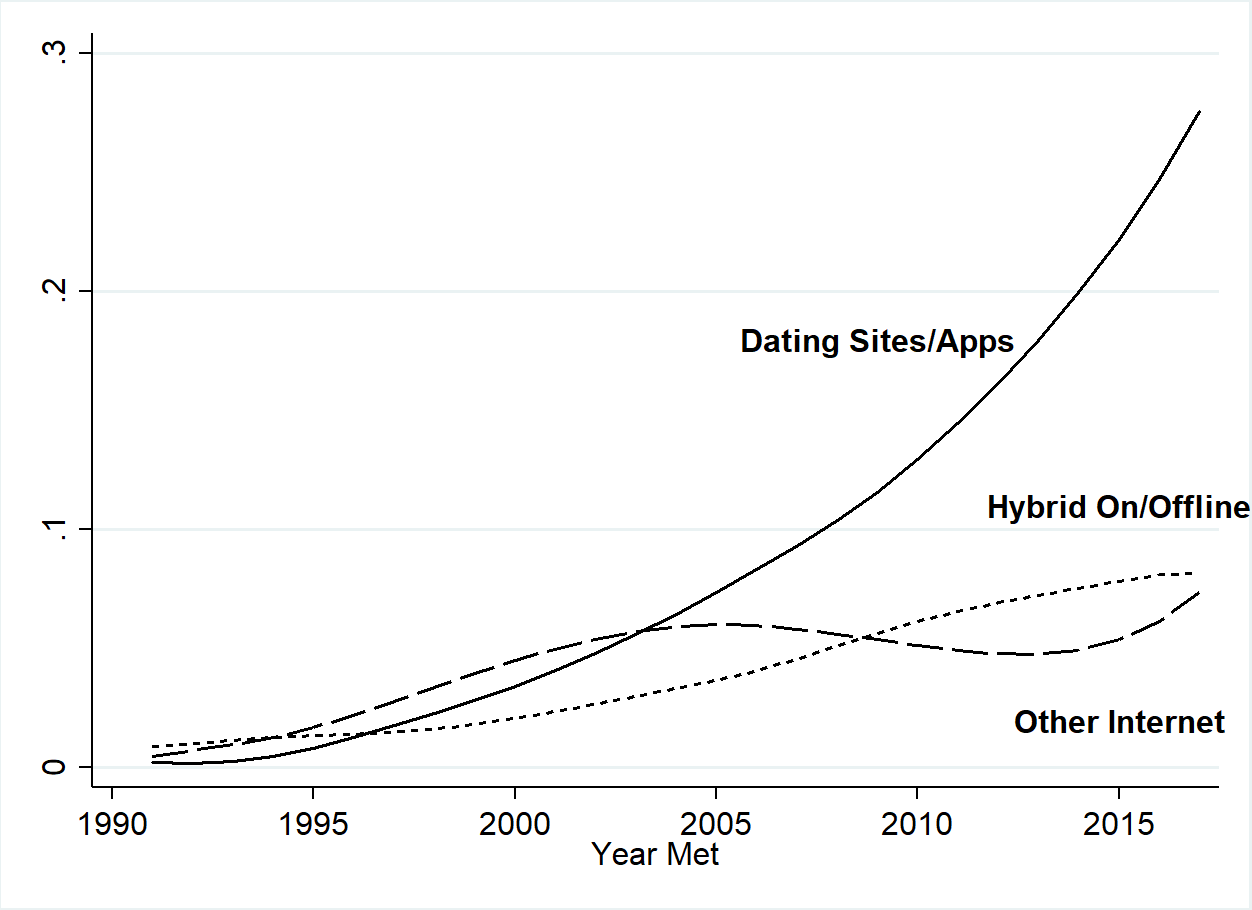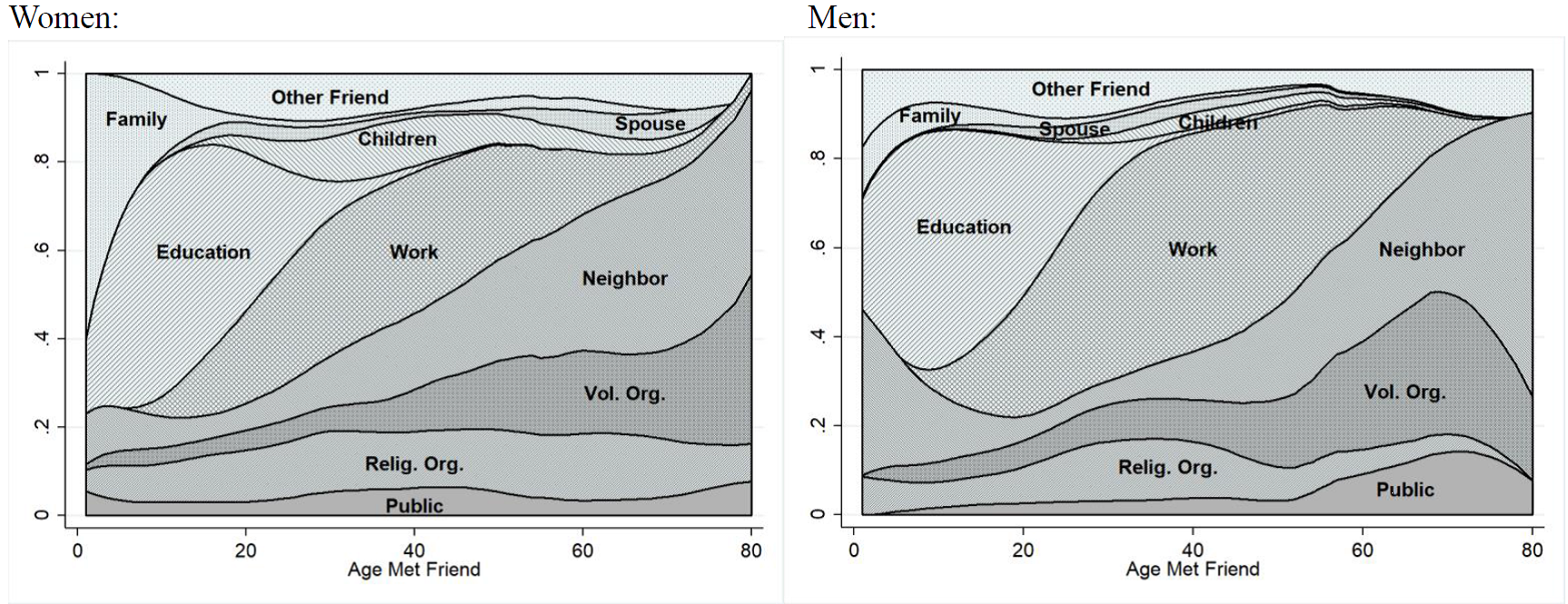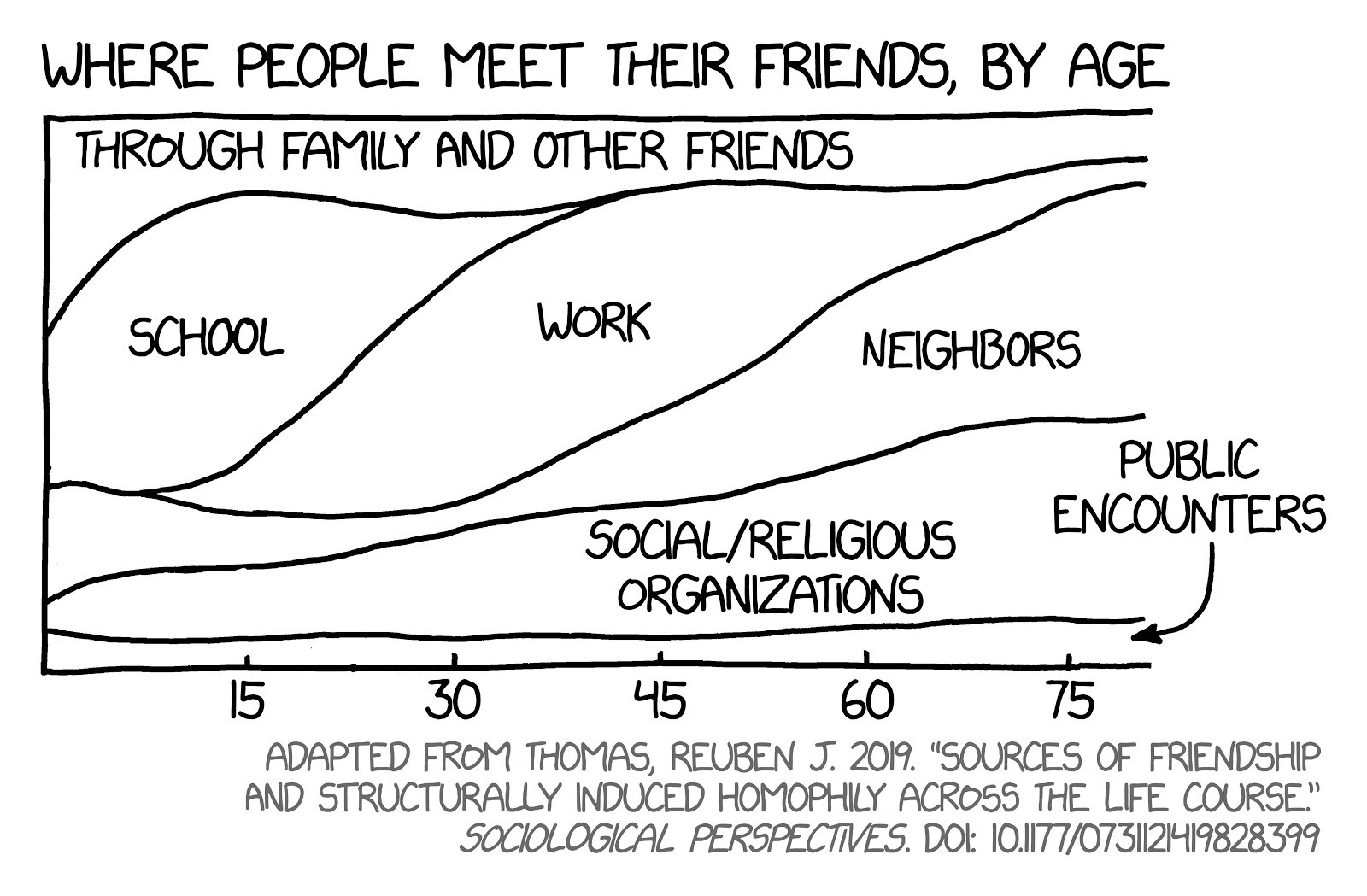

Reuben J. Thomas
Associate Professor of Sociology
Department of Sociology & Criminology
The University of New Mexico
MSC05 3080
1915 Roma NE Suite 1103
Albuquerque, NM 87131-001
Email: reubenjthomas@unm.edu
Office: Social Sciences Building, Room 1070
My most current CV
Thomas, Reuben J. 2020. "Online
Exogamy Reconsidered: Estimating the Internet's Effects on Racial,
Educational, Religious, Political and Age Assortative Mating." Social Forces 98,3: 1257-86.
(working paper version)
Proportions of Couples who Met Online, by Year and Online Source:

Thomas, Reuben J. "Romantic Opportunity Hoarding: Stratified Differences in How Couples Meet."
Rosenfeld, Michael J., Reuben J. Thomas, and Sonia Hausen. 2019. "Disintermediating Your Friends: How Online Dating in the United States Displaces Other Ways of Meeting." Proceedings of the National Academy of Sciences 116,36: 17753-8.
Rosenfeld, Michael J., Reuben J. Thomas, and Sonia Hausen. 2019. How Couples Meet and Stay Together 2017 Fresh Sample. [Computer files]. Stanford, CA. Stanford University Libraries.
Thomas, Reuben J. 2014. "Online Dating Can Change The World, But So Far It Hasn't." Issues: Understanding Controversy and Society. ABC-CLIO, 2014. Web. 16 Sept. 2014.
Rosenfeld, Michael J. and Reuben J. Thomas. 2012. "Searching for a Mate: The Rise of the Internet as a Social Intermediary." American Sociological Review 77,4:523-47.
Rosenfeld, Michael J. and Reuben J. Thomas. 2009. How Couples Meet and Stay Together, Wave I: Public version 1.01 [Computer file]. Stanford, CA: Stanford University Libraries, 2009-11-01.
England, Paula and Reuben J. Thomas. 2006. "The Decline of the Date and the Rise of the College Hook Up." in Arlene Skolnick
and Jerome Skolnick (ed.) Family in Transition. Boston: Allyn and Bacon.
[Reprinted 2009 in Susan J. Ferguson (ed.) Mapping the Social Landscape: Readings in Sociology. New York: McGraw Hill.]
Thomas, Reuben J. 2019. "Sources of Friendship and
Structurally-Induced Homophily Across the Life Course." Sociological Perspectives 62,6: 822-43.
(working paper version)
How Americans Meet the Two Non-Family Friends They Most Often Socialize With, by Gender and Age Met:

Randall Munroe's adaption for his new book, combining women and men:

Thomas, Reuben J. and Daniel A McFarland. 2010. "Joining Young, Voting Young: The Effects of Youth Voluntary Associations on Early Adult Voting." Working Paper No. 73, The Center for Information & Research on Civic Learning & Engagement (CIRCLE), Tufts University, Medford, MA.
McFarland, Daniel, James Moody, Jeff A. Smith, David Diehl and Reuben J. Thomas. 2014. "Network Ecology and Adolescent Social Structure." American Sociological Review 79,6:1088-121.
McFarland, Daniel A. and Reuben J. Thomas. 2006. "Bowling Young: How Youth Voluntary Associations Influence Adult Political Participation." American Sociological Review 71,3:401-25.
Thomas, Reuben J. and Noah P. Mark. 2013. "Population Size, Network Density, and the Emergence of Inherited Inequality." Social Forces 92,2:521-44.
Page-Reeves, Janet, Megan Rivera, Lidia Regino, Maria Tellez, Jackie Perez, Dulce Medina, Virginia Sandoval, Camille Vasquez, Daniel Perez, Pachely Mendivil-Aguayo, Reuben J. Thomas, Elaine Bearer, Alejandro Aragon, Cristina Murray-Krezan. (forthcoming) "Revealing the Power of Peer Support in the Lives of Women Immigrants from Mexico." Human Organization.
Mendivil-Aguayo, Pachely, Megan Rivera, Daniela Armendariz, Daniel Perez Rodriguez, Camille Vasquez, Lidia Regino, Maria Tellez, Jackie Perez, Dulce Medina, Virginia Sandoval, Cristina Murray-Krezan, Alejandro Aragon, Reuben J. Thomas, Elaine L. Bearer, and Janet Page-Reeves. 2024. "Zoom & WhatsApp Digital Information and Communication Technologies (ICTs) Enhance Community Engaged Research with Women Immigrants from Mexico." Journal of Community Practice.
KSFR (Santa Fe, interview), "Internet Love is Here to Stay," with Mary Lou Cooper, 3/4/2020.
KQED (San Francisco), Forum (panelist), "The Decade in Dating," with Rachel Myrow, 12/27/2019.
Albuquerque Journal, "Old Dating Ways Outdated; Love Now Found on Apps," Ryan Boetel, 11/3/2019.
Satuday Night Live, Weekend Update, "Pete Davidson on Sexually Transmitted Diseases," (the part about online dating desegregating, at 1:17), 10/12/2019.
NBC News (op-ed), "Online Dating, Now the Most Common Way Couples Meet, is Desegregating America," Reuben J. Thomas (me), 10/6/2019.
Forge, "How to Make Friends the Hard Way and the Easy Way," Randall Munroe (of xkcd.com), 8/28/2019. Also in his new book HOW TO: Absurd Scientific Advice for Common Real-World Problems
Slate.com, "How Meet Cutes Have Changed in the 21st Century," Heather Schwedel, 7/15/2019.
Washington Post, "Tinder has more matchmaking power than your BFF. But dating apps aren't necessarily your friends." Lisa Bonos & Andrew Van Dam, 6/19/2019.
Quartz, "Friend Zone: Here's where Americans meet the friends they see the most," Corinne Purtill & Dan Kopf, 9/12/2018
The Economist, "Meet markets: How the internet has changed dating," 8/18/2018
Market Watch, "Online dating is bringing Americans of all religions, race and classes together," Quentin Fotrell, 3/7/2018
BBC News, "Love and dating after the Tinder revolution," Padraig Belton, 2/13/2018
New York Times, "First Comes Tinder, Then Comes Marriage?" Sophia Kercher, 4/19/2017
Atlanta Journal & Constitution, myAJC.com, "New
study: Why cliques flourish in some high schools and not others," Maureen Downey, 11/7/2014
Boston Globe, Uncommon Knowledge, "Inequality: Blame Social Networks?" Kevin Lewis, 8/11/2013
Jezebel.com, "You Won't Meet Prince Charming at the Supermarket, No Matter What Crystal Light Says," Anna North, 1/10/2012